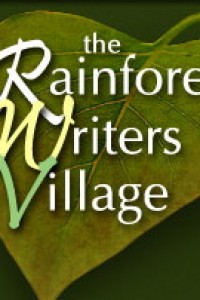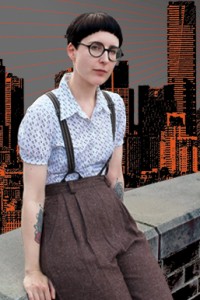Ted Kosmatka: Game Master
 Theodore Anthony Kosmatka was born December 16, 1973 in northwest Indiana, and was raised in Chesterton IN. He studied biology and chemistry at Indiana University, and worked as a zookeeper, steel mill worker, and laboratory research tech before becoming a writer for video game company Valve in 2009 (a job he describes as ‘‘like working in heaven, and your big fear is being kicked out of paradise.’’) Kosmatka has five children and lives with his second wife in Washington State.
Theodore Anthony Kosmatka was born December 16, 1973 in northwest Indiana, and was raised in Chesterton IN. He studied biology and chemistry at Indiana University, and worked as a zookeeper, steel mill worker, and laboratory research tech before becoming a writer for video game company Valve in 2009 (a job he describes as ‘‘like working in heaven, and your big fear is being kicked out of paradise.’’) Kosmatka has five children and lives with his second wife in Washington State.
Kosmatka’s first professional story sale was ‘‘The God Engine’’ in Asimov’s (2005). Other notable short stories include ‘‘The Prophet of Flores’’ (2007), Nebula Award finalist ‘‘Divining Light’’ (2008), and Theodore Sturgeon Memorial Award finalist ‘‘Blood Dauber’’ (2009, with Michael Poore). His first novel The Games appeared in 2012 and was selected by Publishers Weekly as one of the best books of 2012. His second book Prophet of Bones is forthcoming in 2013. Kosmatka also wrote a short play, Steel, about life working in a steel mill, and has seen it produced in multiple venues.
Excerpts from the interview:
‘‘I wasn’t one of those kids who read Beowulf at age 4. Up until third grade, I was the wild kid in school, the troublemaker; then I got spinal meningitis. When I was finally conscious and could look around and interact with people again, my circumstances were changed. I’d been this hyper, ADHD kid who was bouncing off the walls, and now I was trapped in a hospital bed. Having nothing to do for hours was like torture.
‘‘My mother went to buy me a book in the hospital gift shop, but she couldn’t find any kids’ books. The only thing she could find were adult science fiction novels, so she bought Orion by Ben Bova and brought that to me. Up to that point, I’d never sat still for reading, but in the hospital it was my only option. So I read it, and I thought, ‘Where have books like this been all my life?’ I didn’t know that kind of storytelling existed. I think it took me the entire hospital stay to finish the novel. But after that, I was hooked.
…
‘‘The idea for my first novel goes all the way back to a job I had when I was 15 years old, as a corn de-tasseler on a farm. Since corn has both male and female reproductive organs, there’s a danger of self-fertilization if the tassels aren’t torn off. For normal corn, this isn’t a problem. But for hybrid seed corn, the idea is to get two different strains of corn to cross-pollinate, so the company would plant alternate strains every other row. Then it was my job to sit in a basket on a tractor that they drove across the field, and I’d tear the tassels off one strain of corn. I was working for below minimum wage (in Indiana, that was legal in agriculture, at least at the time). In high summer, a cornfield like that is a very science-fictional setting: you’re on Planet Corn. As far as you can see, corn is everywhere, like nothing else exists, and your hands are going and going, tearing at the tassels. You have to throw the tassels far enough behind you or you’ll get three feet of them stacked up in the bucket with you. Your body has to be totally focused, but your mind starts to drift. Doing this twelve hours a day, you have to daydream, or you’ll go crazy. At the time, all this effort to control the genes of corn got stirred around in my head, and somehow the idea of genetically engineered plants was transformed into an idea about genetically engineered gladiators. Or maybe it was just heat stroke. But the idea stuck….
 ‘‘The original title was The Helix Game, but later it became just The Games. The novel lived in slush piles for years, during which time I went from having no agent, to having an agent who couldn’t sell it, to having no agent again. My novel had birthdays in slush piles. I got a rejection from one publisher after 18 months or so in the slush pile, and I thought, ‘That’s it. I must not be any good at novels. I’ll just keep writing short stories.’
‘‘The original title was The Helix Game, but later it became just The Games. The novel lived in slush piles for years, during which time I went from having no agent, to having an agent who couldn’t sell it, to having no agent again. My novel had birthdays in slush piles. I got a rejection from one publisher after 18 months or so in the slush pile, and I thought, ‘That’s it. I must not be any good at novels. I’ll just keep writing short stories.’
‘‘Then I received an e-mail out of the blue from an agent, Seth Fishman, saying he’d been told about my short stories and was curious if I had a novel. I told him he probably wouldn’t want it, that it had already been rejected. But he wanted to see it anyway. He read it, and said he thought he could sell it. I told him, ‘Okay, if you think you can sell it, good luck.’ To my total shock, he sold it immediately. The novel wouldn’t exist if I hadn’t gotten that e-mail from Seth.”
…
‘‘I just finished something completely different. The Bone Prophet is a what-if thriller set in a world where the Earth is young. The elevator pitch is this: in the 1950s carbon-14 dating proved the world to be only 5,800 years old. But the catch is, none of the fossils get to change. The inciting incident involves the ‘hobbit’ fossils found in Indonesia. In our timeline, Homo floresiensis– a strange, dwarf population only three feet tall– lived until about 17,000 years ago on the island of Flores. These ‘hobbits’ had a small brain capacity, about the size of chimpanzees, yet they’re found in context with stone tools. In our own timeline, there’s been a lot of academic argument in regard to what these fossils might say about what it means to be human. Some researchers have argued that the fossils are just pathological modern humans– sickly microcephalic dwarfs who just happened to have been preserved in the fossil record. Others feel they’re a new species of tool user. In the creationist world of the novel, the discussion takes on a whole different intensity.”
…
‘‘I come from a long line of steelworkers, so when they offered me a job in the mill, I thought, ‘Okay, I’ll take it.’ During the week-long orientation, they tell you all the ways that you can die, and show you all these gory pictures of people who have died. Then they told me I was being sent to the blast furnace department. I remember being told, ‘Don’t worry. The blast furnace isn’t the worst. At least you’re not going to the sinter plant.’ The next day, I came back for the final day of orientation, and the guy said, ‘There’s been a change. It looks like three of you are going to have to go to the sinter plant.’ I was one of those guys….
‘‘I wouldn’t know what to write about if I hadn’t worked all these jobs, because for me work has always been the way into a story. You can’t really understand your characters unless you know how they’re paying the lot rent on their trailer. Sometimes it seems like I’ve never been in a situation where I needed a character or a background, and I didn’t already have a person or situation that I was fascinated by and wanted to explore.’’


 Read the complete interview, and biographical profile, in the
Read the complete interview, and biographical profile, in the 



